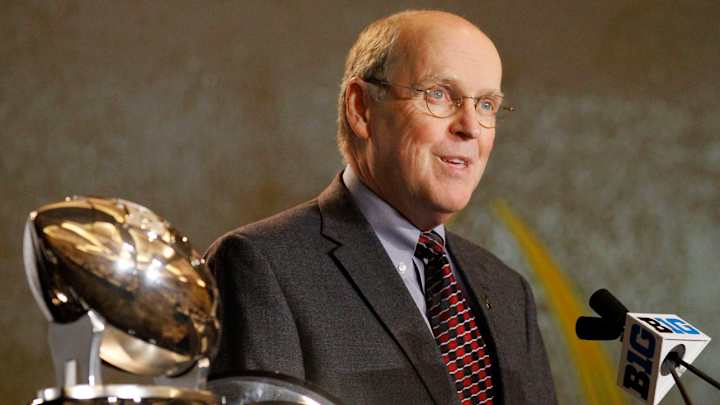College Football Playoff succeeds by altering schedule for future semifinals

I'll miss the commercials the most. After all, nothing promoted College Football Playoff telecasts on New Year's Eve quite like an ad featuring a New Year's Eve party in which the participants are miserable and—this might be important—NOT WATCHING FOOTBALL. The campaign, which starred Jimmy Kimmel and probably cost some serious coin, offered us a sobering reminder that the people who run the CFP are basically the same people who ran the BCS.
But Thursday's news offers hope. After examining a year-to-year ratings sag along with deeper data from ESPN, the conference commissioners who run the CFP did what they so often refused to do when they ran the BCS. They listened and adjusted with the hope of producing a more fan-friendly product. They'll no longer shoehorn playoff games onto New Year's Eve in the years when the semis aren't in the Rose and Sugar bowls. They've decided instead to broadcast the games when people aren't working. Sometimes, such as this season, that'll be Dec. 31 (a Saturday). In 2018, that'll be Dec. 29. If for some reason this doesn't help boost viewership, they'll probably seek another option down the road.
Here are the dates for CFP semifinals going forward. pic.twitter.com/aw0sgVeQAs
— Andy Staples (@Andy_Staples) July 28, 2016
The move reeks of common sense, something that seemed in short supply in the BCS era. It should offer hope for more common sense moves as the playoff moves forward. Eventually, the playoff will need to expand to eight—because that would be an even better event—and the bowls will need to be jettisoned from the playoff process entirely in favor of quarterfinal and semifinal games at college stadiums that offer superior atmospheres, require less travel for fans and reward the teams that performed best in the regular season. Eventually, the people who run the playoff will realize this would make more money for the schools and provide more enjoyment for the fans (customers). After Thursday's decision, I have more faith that they'll come to that conclusion and then act on it sooner rather than later.
The commissioners could have been obstinate here. They could have been arrogant. Their initial idea was that games on New Year's Eve would change the paradigm of the holiday and eventually create a beloved tradition. (Plus the Big Ten and Pac-12 owned Rose Bowl and Big 12 and SEC owned Sugar Bowl had already locked down the prime windows on New Year's Day.) This wasn't a bad idea in theory. I had no issue with trying it, but I have a weird job and am not the best judge of these things. It flopped in practice because most people still have to work on New Year's Eve. So a doubleheader that starts at 4 p.m. on the east coast is going to have built-in issues to overcome. East-coasters miss the first half of the first game. West-coasters miss the entire first game and could miss the first half of the second if traffic is especially gnarly. If the games are on Saturday, that alleviates this issue for the majority of the population.
• Making sense of the Big 12's expansion plans
What is refreshing compared to the BCS era is how quickly the lords of the CFP came to this conclusion. This might have taken years in the BCS era. This change almost certainly has made CFP executive director Bill Hancock's job easier. When the former Final Four director got hired in 2009 as the executive director of the BCS, I listed a few jobs that seemed on par with defending the dumb way college football previously crowned its national champion.
• Ringling Brothers elephant cage cleaner.
• Jon Gosselin's publicist. (This was extremely topical in November 2009. I promise.)
• Tobacco company in-house counsel
• The guy who collects, um, genetic material from bulls for artificial insemination.
Week after week, Hancock had to stand and claim that the BCS was excellent and explain why a playoff would ruin college football when nearly everyone with even a cursory interest in the sport knew a playoff of any kind would be superior to that system. He had to defend the indefensible. Now? He's been allowed for months to hint that the New Year's Eve idea didn't work. Instead of stonewalling, he admitted two weeks ago that the CFP was considering other ideas. Thursday, he got to announce news that scraps what the commissioners originally chose but makes fans happier.
Hancock and I used to have contentious interviews. He'd say a playoff would never happen. I'd argue that a playoff was inevitable because it would bring in more money. Now we have very cordial interviews. He laughs when I remind him of all the times he bashed a playoff system before he began getting paid by one. "College football has the best regular season of any sport, and the lack of a playoff is one big reason why," Hancock wrote in a USA Today op-ed in 2010. That's a particular favorite. Hancock still says the playoff will never expand or ditch the bowls, but I always remind him that he has to say that until it actually happens. The fact of the matter is there are four spots and five power conferences (for now) and an appetite for more games that matter that may also serve to enhance the regular season by making the push for home-field advantage another component to drive interest. This is merely common sense.
The lords of the CFP used common sense with regard to the game dates. Hopefully, they'll keep using it as the playoff concept matures. It's a promising sign that at the first sign of a problem, they admitted they were wrong and moved to make their customers happy.

Senior writer Andy Staples has covered college football for SI since 2008, developing an encyclopedic index of the best food in every college town along the way.